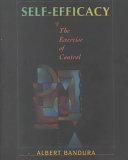
“Self-belief does not necessarily ensure success, but self-disbelief assuredly spawns failure.”
[Self-efficacy: The exercise of control, Bandura, Albert, w:Albert Bandura, 1997, W. H. Freeman, New York, 9780716728504, http://books.google.com/books?id=eJ-PN9g_o-EC&printsec=frontcover&dq=bandura+isbn:9780716728504&hl=en&ei=HAwYTbKsLpTmsQPp8cCPCg&sa=X&oi=book_result&ct=result&resnum=1&ved=0CCMQ6AEwAA#v=onepage&q&f=false] (p. 77)
